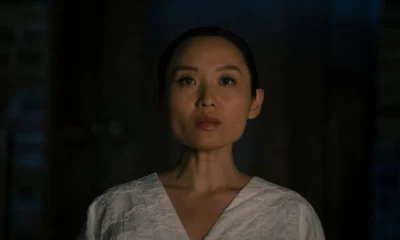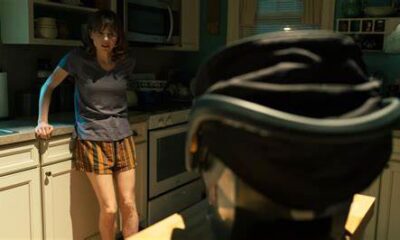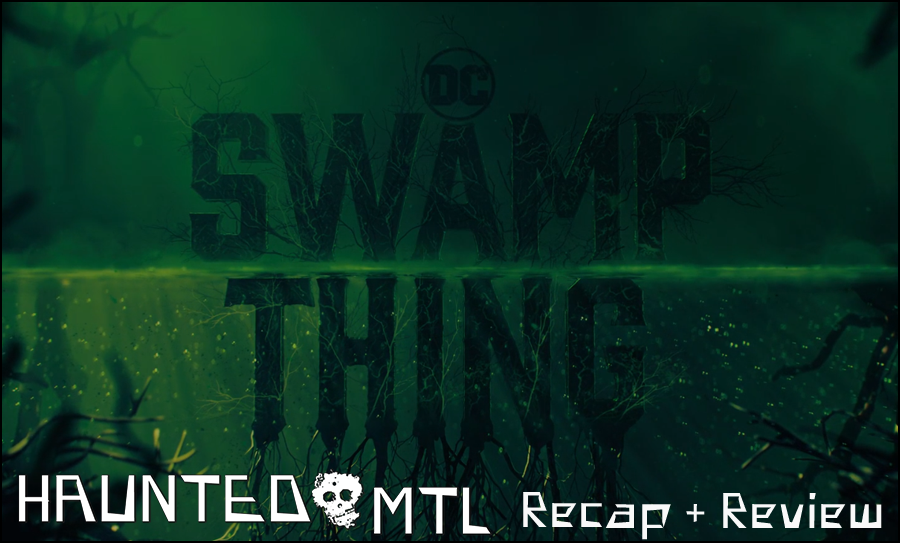
HMTL Recap and Review -Swamp Thing: S1E4 – “Darkness on the Edge of Town”
It’s been a few weeks since the last recap, but the show has marched on. I am going to continue to recap the series, but the revelation of cancellation just strips out a real sense of urgency. We have some other things in development here at Haunted MTL as well that have served to… distract. So, let me apologize about the lateness of this recap/review. We’re going to continue the project. The show is still great, which makes writing this series of posts kind of tough.
The Story So Far
This was a fairly low-key episode with a relatively undercooked bit of swamp evil and a plot of place-setting. That being said, the show is still fantastic.
Abby and Alec Working Together
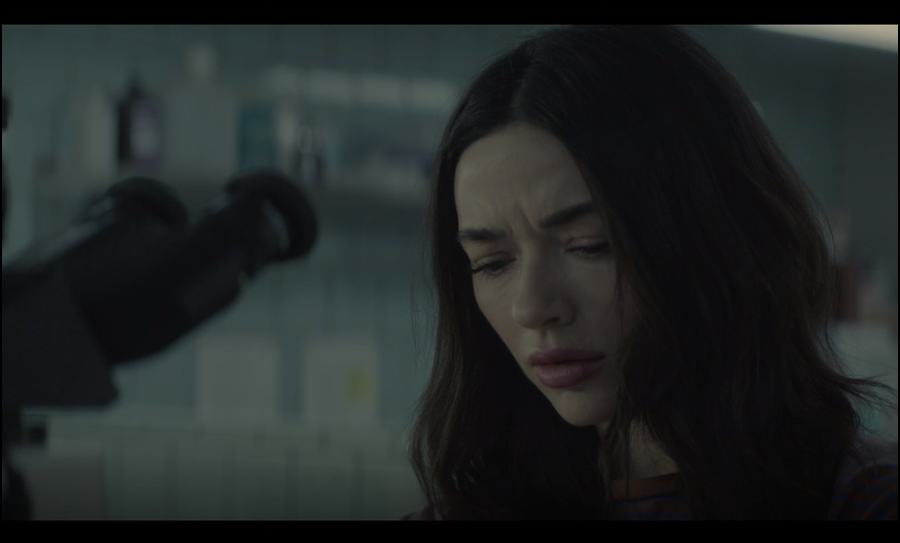
The major narrative of the episode revolves around establishing the nature of Abby and Alec’s relationship given his new form. Abby is very much interested in doing everything she can to aid Alec in understanding his swampy fate. Alec, localized in the swamp, pursues the mysteries of the waters around Marais. The two essentially represent two different worlds and must work across their respective regions to solve the problems that bleed between them.
Unfortunately, this week, the threat feels a little underdeveloped.
Two men enter the swamp to cut down some trees that haven’t been picked over by local logging companies. The trees, enhanced by the pollutants, fight back, dropping a mummified corpse that was lost in the swamp on the men, scratching one of them.
The scratch causes hallucinations of one’s deepest nightmares, driving one of the men, a dishwasher at Delroy’s to kill himself when he hallucinates his arm under attack by a snake. He ends up stabbing himself in the arm repeatedly, and then for good measure jams his arm into the garbage disposal. During the struggle, Delroy, the owner of the bar gets scratched. Thus begins a low-key infection plot culminating with Abby herself getting infected.
Later, an infected and hallucinating Abby finds herself in Alec’s arms as he draws the evil from her and puts in back in the mummy. The mummy being the remains of a person who was infected by this evil and fled to the swamp to make sure it could harm no others. It wasn’t until Alec Holland arrived in the swamp when that could finally, truly happen.
The plot was fairly predictable, but it did a great deal of work to establish the what should be the standard, working relationship of Abby and Alec; a relationship that should be effective and entertaining.
Sunderland’s Schemes
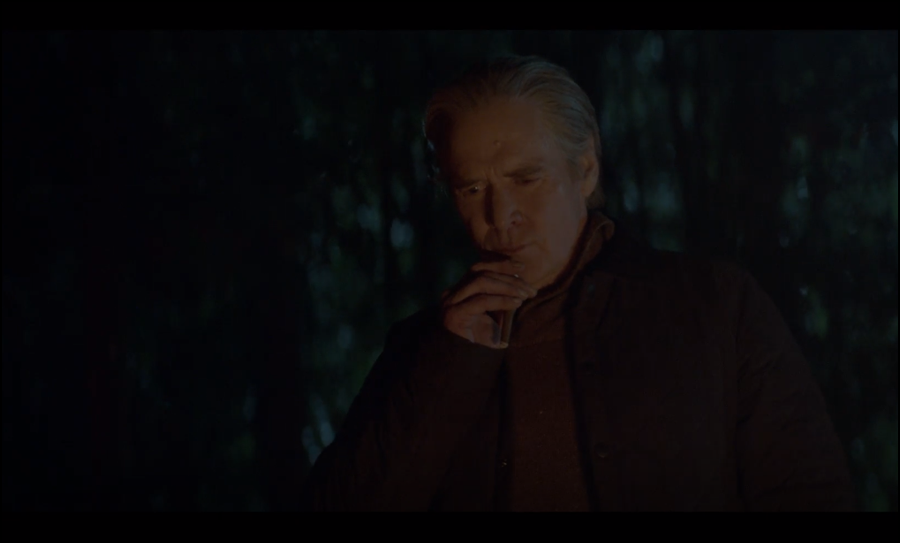
It is not surprising that Avery Sunderland has a dark and tragic past. The episode opens with him destroying the remains of poor old Gordon and remembering an incident in his past where his most-likely abusive father berated him for being unable to kill a gator. The scene doesn’t really tell us anything we couldn’t have already assumed about Avery, but it should, hopefully, lay groundwork for a more significant revelation in the future.
The major thrust of the Sunderland subplot revolves around Avery’s manipulative nature; both toward the town and Maria as well. Avery still needs the dose of funding to keep Woodrue on the case regarding the biological properties of the swamp. While inviting survivors of “the green flu” to a crawfish boil, he spies Maria’s attention toward the young Susie.
Throughout the episode we see Avery manipulate everyone around him to try to get the young Susie into a position where he can bring her into the Sunderland home, to give Maria a new child to care for. Not necessarily out of the goodness of his own heart, however. After all, “the green flu” may be gone, but who knows what after effects might pop up. If only there was funding to keep Woodrue on the job…
Of course, he doesn’t know about the ghost of Shawna lurking around Maria… might there be a possession in the future?
Daniel and Xanadu and the Incoming Darkness
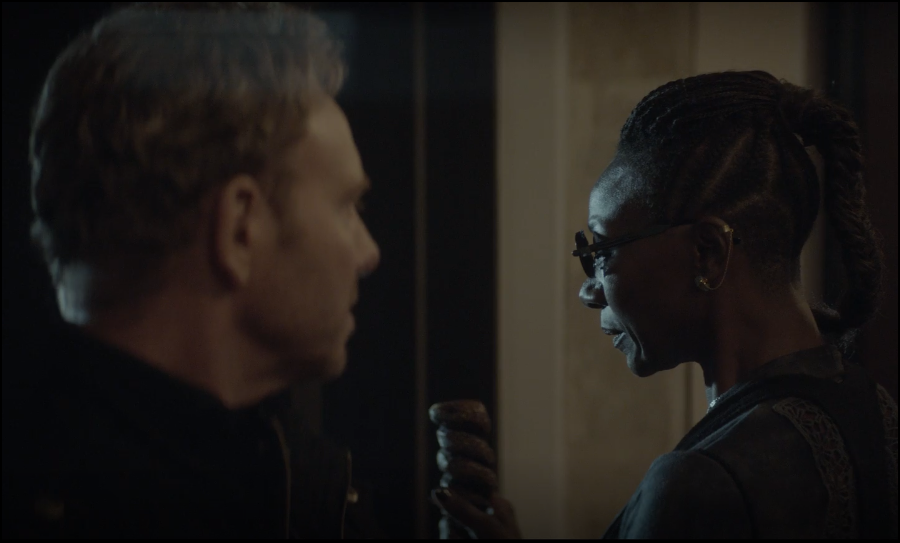
The cryptic teasing of Daniel Cassidy’s history and reason for being stuck in Marais moves at a snail’s pace this week. All we really learn is that he made a deal that forced him to stay in town. For comic fans already familiar with Cassidy, the implication is pretty clear, but for the average viewer, it is just more cryptic teasing. We do get a moment of heroism from Daniel when he helps disarm sheriff Cable that belies the nature of his potential future, however.
Meanwhile, Madame Xanadu is concerned her powers may be waning. She has hinted at the spreading darkness from the swamp, just as Alec has begun to sense if through the plant life in the area. Perhaps a trip to the source of the darkness on Xanadu’s part is what will bring these character together.
What Stood Out?
The scene with the stabbing of the arm and the garbage disposal was fantastic and keeps up that body-horror component of the show that has worked out so well so far. It’s been great that every episode has at least one incredibly gory or gross-out moment.
Also, kudos to the show for including the Swamp Thing in a daylight sequence, allowing us to see the details of the prosthetics and makeup. The work holds up incredibly well and, hopefully, means we’ll get some great, brighter lit scenes with the effects and outfit before the end of the series.
The Final Verdict on Swamp Thing
This episode is very much a place-setting episode, moving pieces around for a larger payoff. Thankfully, it was still very entertaining and keeps up the visual excellence that has been the hallmark of the show so far.

Deep Roots
Comic connections are initially a little sparse this week. No real new introductions to characters are made, so there is nobody new to introduce from the comics. That being said, there is an exception regarding Abby’s hallucination. We see her confronted by a faceless man who talks about her mother as he threatens and berates Abby. She’s had nightmares about this man since childhood. This man is potentially Grigori Arcane, her father, also known as the Patchwork Man. As for his being faceless? Well, we all process trauma differently… though he could also, literally have been faceless. We’ll see if we encounter Abby’s uncle Anton later.
Movies n TV
Wheel of Time A Question of Crimson Is a Political Espionage Delight
Episode two of Wheel of Time felt like the beginning of a long journey. Stories are unfolding, lives are changing, and blood is spilling.
Let’s discuss.
The story
We begin this episode in the past with Elayne’s mother, Queen Morgase. It turns out her rise to the throne was a bit, shall we say, cutthroat. So when she shows up at the White Tower, Siuan is concerned.
She might have reason to be, too.
Meanwhile, Rand, Egwene, Moiraine, Lan and Aviendha are in the Spine of The World. As they travel through some of the most breathtaking lands I have ever seen on a TV show, Egwene is plagued with nightmares. We think at first that’s just her trauma working itself through her system. But we soon find out that it might not be that straightforward.
Finally, Perrin returns home to heal after his hand is almost cut in half. But when he gets there he finds the town has been infested by Children of The Light. And they’re looking for him.
What worked
There was something heartwarming in this episode about political espionage and choking religious persecution. And that is Elayne’s relationship with her family.
I have consumed a lot of fantasy content with royal families. And I have never once heard a princess call her mother ‘Mum’. I’ve never seen royal siblings get along. And I have sure as hell never seen a princess have a good relationship with her step-parent.
This was refreshing. Even though Queen Morgase is kind of a horrible person she seems like a good mother. And that’s an unexpected delight.

Of course, this is just one storyline among many. And while this can sometimes be overwhelming, in this case it wasn’t.
I’ll be honest, some of these storylines are going to drag for me. I know this because I’ve read some of the Wheel of Time books and I have an idea that not all the characters exactly pique my interest.
No one likes all the characters. No one likes all the storylines. While I am here for the political espionage between Queen Morgase and Siuan, not everyone likes it. While others might be fascinated with Selene trying to win Rand back, I couldn’t care less.
Having multiple storylines keeps everyone’s attention better. So long as things don’t get out of hand. Things can easily get out of hand. But this seems to be managed well.
So far.
What didn’t work
As I mentioned above, I’m not thrilled with Rand’s story at this point. And while it’s fine to not like a storyline when there are this many to choose from, it’s not fantastic that the one I like the least is the one involving our two main characters. And anytime we were with the team at the Spine of The World, the only thing that brought me joy was Moirain’s hat. It reminded me of Stockard Channing’s hat in Practical Magic.
The problem is that Rand is Charlie Brown with controversial magical powers. He is boring, serious, and pessimistic.
And yes, I understand that he has a heavy emotional burden and he’s the Dragon Reborn and that’s quite taxing and all. But let’s be fair, there isn’t a single person in this show that doesn’t have a heavy burden. And most of them manage to be fun occasionally.

All that being said, this episode of Wheel of Time did exactly what it needed to do. It set up conflicts at each of the three locations. It established emotional ties between the characters and the events. And it established goals for everyone.
This was, in short, a solid episode. Not groundbreaking, not mind-blowing or life changing. It was simply good. It was entertaining and moved the plot forward.
Well done.
 (3.5 / 5)
(3.5 / 5)
Movies n TV
Wheel of Time Returns With A Bang
Wheel of Time is back for season three. There are mixed feelings regarding this. Last season, there were some serious pacing issues. And some serious sticking to the book’s storyline issues. But we’re two seasons in, and we don’t give up so easily. So let’s dive into episode one, To Race the Shadow.
By the way, I highly recommend watching this episode with the subtitles on. You’ll see why.
The story
We begin this episode with Liandrin facing a trial of sorts for her rampant betrayal. She does her best to gaslight her Aes Sedai sisters into thinking that Siuan Sanche is the real traitor.

When that doesn’t work, she reveals how many Black Aes Sedai have actually infiltrated the tower.
Spoiler, it’s a lot.
In the aftermath, our whole team gathers to drink and enjoy one night of relaxation before they head out to the Tear to form an army for Rand. All is going well until they’re attacked by myriad creatures and a sentient axe.
What worked
This episode was long. It had a run time of an hour and eleven minutes. And a lot of that run time was spent in heavy dialog scenes.
Fortunately, these were well-done scenes.
If you’re going to have a lot of talking scenes, there are good ways and bad ways to do it. Last season, we saw lots of examples of the bad way to do it. But this episode did it well. For one thing, other things were going on while conversations were taking place. The characters are drinking, playing games, walking through an interesting city. And the scenes themselves didn’t stretch out. They weren’t repetitive. We heard what the character had to say, then we moved on.
It was also nice that the point of these scenes wasn’t just info dumps. We had character development. We had romantic interactions. We had plot development and foreshadowing.
Overall, this episode felt like what it was. A moment of calm before a storm.
Taking a step back, I’d be remiss if I didn’t address the fight scene at the start of the episode. Because it was epic.
The magic looked amazing. The martial arts that went along with it looked fantastic. The costumes were beautiful. It was just incredibly fun to watch.
More than that, it was emotional. We lost some characters in that fight that were important. And it was clearly emotionally shattering for many of our characters, who found themselves betrayed by people they trusted.
So many of them.
It was a great way to open the season.
What didn’t work
Despite that, this episode wasn’t without its flaws.
First off, there were a lot of dialog scenes. And they were good scenes, as I’ve already discussed. But it was one after another after another. And when your episode is, again, an hour and eleven minutes, it’s maybe a little much to have so much chit-chat. Couldn’t some of these conversations, important as they were, have been moved to maybe another episode?
Finally, I want to talk about Egwene’s travel through the arches.

I feel like maybe there were some deleted scenes here. Because there must have been more to that visit than what we saw, right?
We could have seen Egwene battle Rand. That would have been badass and emotionally devastating. We could have seen her with a quiet life with Rand back home at the Two Rivers. We could have seen anything except for the quick clip of Rand in a bloody river, followed by Egwene being shoved back out in a bloody shift.
No products found.
Bad job. But at least it wasn’t an extended scene of Moiraine collecting bathwater, and then taking a bath while looking sad. If we’d started this season with another scene like that, it might have broken my brain.
Amazon dropped the first three episodes at once. So we’ll be back soon to talk about episode two. See you then.
 (4 / 5)
(4 / 5)
Movies n TV
Entertaining as hell: Eight Legged Freaks (2002) Review
Early 2000s is a special era for the industry. It accepts the cheesiness and corniness of movie making, in turn producing some gems in their own right. Eight Legged Freaks starring David Arquette and young Scarlet Johanson is a horror comedy about giant spiders who overtake a small town. As crazy as that premise sounds, the movie surprisingly has a ton of heart and is super entertaining. Let’s review, shall we?
Plot
We start Eight Legged Freaks with a shot of toxic waste spilling into the water supply of Joshua, a spider farm owner. He is friends with Mike, one of our protagonists, who is a science geek and a spider enthusiast. Mike notices something quite right upon visiting Joshua, but no one takes him seriously. We are then introduced to the rest of the crew. Mike’s mother Samantha, the town sheriff, is too busy chasing Ashley, his sister, who is dating the town mayor’s son Bret (something Samantha does not approve of). We also have Chris, who returns to the town to save his father’s legacy in the town mines. He has opposition from Wade, Bret’s father, who wants to use the mines for his business ventures. Lots of drama going on that will only get juicier once the spiders get loose.
The creepy crawlies quickly dispose of Joshua and make their grand appearance after Ashley rejects Bret’s advances, abandoning him in the middle of a desert. A glorious chase sequence ensues as the spiders make their way towards the town, wreaking havoc on its residents. In a true horror fashion (which the movie acknowledges), it takes some convincing from Mike and then from Samantha for the town to take the threat seriously. The tongue-in-cheek style of narrative adds the comedy aspect to a movie that would otherwise burn out fairly quickly.
The remaining characters hide out in a shopping mall as it’s the only somewhat sturdy building in the area. This doesn’t last long as the spiders break in, forcing them to run through the mines. Their resources to fight the creepy crawlies off are limited as the methane gas doesn’t allow them to use firearms. Such conditions require resourceful thinking from Chris, who uses perfume to fend off the leader of the spider group and save himself during the climax of the movie.
Character dynamics are not forgotten once the action kicks in. We have Chris confessing his long-term feelings for Samantha which she knew all along, which provided some comedic relief. Bret also reunites with Ashley and apologises for being an asshole. Mike finally gets the appreciation he deserves as his knowledge saves the townsfolk more than once during the whole ordeal.
We end the movie with the town’s radio show person telling the story as an urban legend during his segment. This brings it into question – how much of it happened the way he said it did? We can only guess…
Overall thoughts
Eight Legged Freaks is a fun creature feature with some self-aware commentary on genre tropes that doesn’t take itself too seriously. The acting is good, the pacing fitting and the characters are likeable enough for you to want them to make it through. Definitely a must watch, if you don’t suffer from arachnophobia, that is.
 (5 / 5)
(5 / 5)
- What do you get when you cross toxic waste with a bunch of exotic spiders? Eaten! The townies of Prosperity, Arizona will all become a screaming smorgasbord if mutated arachnids as big as SUVs have their way in this comedy/horror crowd pleaser whose creators include the producers of Independence Day and Godzilla
- Spiders that leap like gazelles, web-spitting spiders, spiders that suck your insides out as if through a straw—they’re all among the behemoths conjured up by an inventive effects team
- David Arquette (Scream) leads the two-legged stars, mobilizing the citizenry in a last-ditch fight to survive
Last update on 2025-03-10 / Affiliate links / Images from Amazon Product Advertising API








